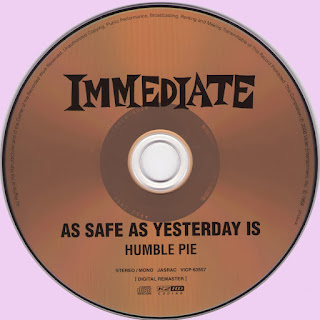A suitable follow-up to the group's seminal (fourth) album, "Just For Love", the album, "What About Me", produced soon after its release with its title song a widely-played anthem of sorts for the early 1970's. The title song was aired repeatedly over the radio on numerous progressive-rock FM stations from coast to coast. It was written by Dino Valente; the song's lyrics reflected the songwriter's concern for the environment as well as his strong distaste for certain laws of the land at that time, specifically, laws prohibiting the use of some recreational drugs. The song, "What About Me", was a forceful, and yet a typical, protest song of the late 1960's and early 1970's, played over the airwaves during a period of time when the country was engulfed in numerous protests that took on a wide range of issues, including protests against our nation's involvement in faraway Vietnam, an unjust war that, for a good number of years, had no visible end in sight. Fortunately, with the eventual passage of time, positive change did come!!
Certain tracks on this particular album were recorded during the same sessions in Hawaii that produced its predecessor. As a result, the lineup of the band, in essence, remained unchanged on this album with the heart of the group's driving force consisting of two(2) competent lead guitarists in John Cipollina and Gary Duncan, and the infamous piano player, Nicky Hopkins. The rest of the band consisted of David Freiberg on bass, Greg Elmore on drums, and the late Dino Valente as singer and songwriter.
Soon after the recording of these "twin" albums, namely, "Just For Love" and "What About Me", the band's lineup began gradually to change. With the arrival of Dino Valente at this particular time during the group's history, and just in time to inject some much-needed energy, there appeared to be a sudden shift in power within the group and thereupon, a slight change in its musical direction, too. Mr. Valente's immediate background, prior to rejoining the band, had been as a solo artist in New York City. Consequently, the band now began to record an occasional ballad or two sung by Mr. Valente, in contrast to the band's other tracks that reflected San Francisco's brand of harder (and at times, psychedelic) rock. Having had rejoined the band as lead singer, Dino Valente became the group's frontman on stage and, for better or worse, the band's de facto leader, as oftentimes was the case within a rock band at that time when the lead singer and writer of most of a band's songs took the helm.
The title song of this album, "What About Me", was similar in its intensity and stance (critical of society's ills) to another song that Dino Valente had recorded during his days in New York City while he sang as a lone troubadour. The song, "Children of the Sun", likewise became popular, and with time, it grew to become another anthem of sorts for its day. As such, it received its share of airplay on the radio, too, but predominantly in California and on the West Coast. (The song can still be heard on Dino Valente's only solo album, "Dino Valente.")
by Sharpphoto "Sharp"
Tracks
1. What About Me (Jesse Oris Farrow) - 6:40
2. Local Color (John Cipollina) - 2:56
3. Baby Baby (Jesse Oris Farrow) - 4:40
4. Won't Kill Me (David Freiberg) - 2:30
5. Long Haired Lady (Jesse Oris Farrow) - 5:52
6. Subway (Gary Duncan, Jesse Oris Farrow) - 4:25
7. Spindrifter (Nicky Hopkins) - 4:33
8. Good Old Rock and Roll (Jesse Oris Farrow) - 2:29
9. All in My Mind (Gary Duncan, Jesse Oris Farrow) - 3:44
10.Call On Me (Jesse Oris Farrow) - 7:35
QMS
*Dino Valenti - Vocals, Guitar, Flute, Percussion
*Gary Duncan - Vocals, Guitar, Bass, Percussion, Organ
*John Cipollina - Guitar, Percussion
*David Freiberg - Vocals, Bass, Guitar
*Greg Elmore - Drums, Percussion
*Nicky Hopkins - Piano, Keyboards
Guest Musicians
*Martin Fierro - Flute, Alto Sax, Tenor Sax, Winds
*Frank Morin - Saxophone, Tenor Sax
*Mark Naftalin - Piano
*Pat O'Hara - Trombone
*Jose Reyes - Percussion, Conga, Vocals
*Ron Taormina - Saxophone, Baritone Sax, Soprano Sax
Free Text
Text Host



